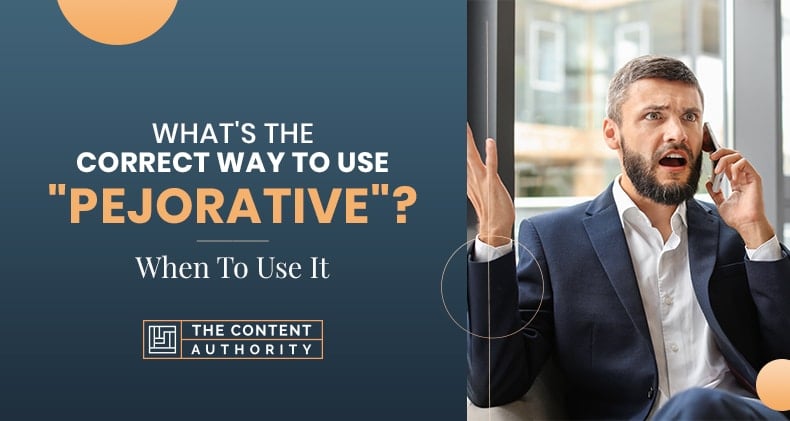Some words in the English language may seem non-offensive initially. However, when you dig deep or try to learn more about its etymology and historical use, you get to see the other, not-so-pleasant side of the term. In other words, certain words tend to have a “pejorative” subtext.
The word “pejorative” denotes “hurt”, “insult”, “disparaging”, etc. At times, the label is used in glossaries and dictionaries to detect expressions that belittle or offend something or someone. Note that a term could be used pejoratively in a given context and non-derogatorily in other situations.
More than learning about “pejorative” and using the word in different scenarios, it’s vital to know more about different pejorative terms, how they imply different things based on the texts they get used in, etc. Read on to get educated.

“Pejorative” – Meaning
The term “pejorative” denotes “a phrase or word with negative connotations”. It indicates “having a low or bad opinion about something or someone” or “not being respectful towards a person or a situation”.
Synonymous terms or words related to “pejorative” include:
- belittling
- degrading
- demeaning
- deprecatory
- derogatory
- disparaging
- scornful
A “slur” is typically characterized as pejorative, neutral, co-extensional with other terms that refer to a social or ethnic group.
The Term’s Origin
“Pejorative” is derived from “pejoratus”, a Latin term that in turn borrows from “pejorare”, another Latin word that means “to become or make worse”.
In English, words that could add fuel to the fire or make a bad scenario worse have existed since the advent of the language. Some of the synonym terms above are examples. However, “pejorative” is relatively new, having made its foray into the language only during the late 1880s.
Changing with Times
At times, a specific term could be pejorative only in certain ethnic groups or social communities. The animal “pig”, for instance, is considered “haram” or forbidden in Islam. It’s not so in other religious communities.
Similarly, some things or a word or phrase may have been considered “pejorative” initially. Still, it could have evolved to adopt a more pleasant undertone or meaning with time in particular or all contexts/communities.
For example, ethnic terms such as “gitano”, which means “a male Spanish Gypsy”, have a “neutral” and an “extensional” usage. But it also has a pejorative meaning that builds on the Romani community’s negative stereotypical representation.
In historical linguistics, the phenomenon of words starting their journey as a “pejorative” and later getting adopted non-pejoratively is called “melioration”. The occurrence could also be termed as “amelioration”, “semantic change”, or “reclaiming”.

Offensive, But Not Always
In English, quite a few words could have multiple definitions, opening the possibilities for specific terms to be pejorative and non-derogatory – based on when the term is used and by whom. Such words could be confusing, particularly to people who aren’t native speakers of English and have just started to learn the language and its various complexities.
“Monkey”, “Ape”, “Chimpanzee”, Etc.
The word “monkey”, for instance, is usually considered derogatory. But then parents use the word to describe their kids playfully and innocuously. Small kids usually like being referred to with names that denote animals. Such affectionate appropriation of “monkey” and other animal names has been in use since the 1600s.
However, calling an adult, a “monkey” may not go down as humorous and could offend the individual, mainly if the word is used during a heated conversation. Not to mention, improper usage of “monkey” or “ape” to refer to black people has been in existence for centuries.
“Ghetto”
The word “ghetto” is derived from “ghettare”, an Italian term that means “to throw”. “Ghettos” is an Italian name for places where Jewish residents were forced to live jointly in secluded areas.
The term was later used to describe similar isolated places wherein the Nazis compelled the Jewish to live, cut off ties from their neighbors and friends, and stay stuck in appalling living conditions.
When “ghetto” entered the English lexicon, it was no longer associated with the Jews and their sufferings. It assumed the meaning “sections of urban regions where marginalized people lived, mostly living in poverty, invariably isolated from other people living in the same city.
If the term “ghetto” is used in conversation and writing as a noun to refer to its historical meaning or place where the Jews were made to live, the word is not offensive and acceptable.
However, when the word is used to mean something that’s “low-class”, “unrefined”, “inferior”, “cheap”, etc., the term is considered derogatory. That’s because the word is perceived to describe someone’s neighborhood negatively. Also, using the term to refer to a person’s neighborhood is considered degrading.
“Savage”
The term “savage” was first used in Middle English during the 1200s. When used as an adjective, it denotes “ferocious”, “fierce”, “cruel”, “uncivilized”, etc.
As a noun, however, the word dates back to around the 1400s. That was a period when Columbus enslaved Native Americans and claimed their work and lands as his own. White Europeans, during the period, used “savage” as a slur to describe or refer to the American Indians.
The derogatory use of the word has stuck for several hundred years. Even today, it’s a term that several indigenous people across the globe (not just First Americans) find offensive.
In the Internet world, the term is used to describe things or actions deemed particularly fierce. However, the racist connotations are hard not to see, and it’s therefore recommended to steer clear of the word in texts or writings as much as possible.
Kindly note, the above are only some of the many words that could negatively imply specific contexts.

Using the Word “Pejorative” in Texts
Pejorative can function as a noun or an adjective in sentences. The adverb version is “pejoratively”. The adjective is used in texts to belittle or disparage something, as alluded to earlier. For example:
- Some scholars eschew the particular word due to its pejorative connotations.
- The topic was brought up in the movie by the character in a somewhat pejorative way.
- The discussions may have seemed pejorative, but that was not our intention.
- The pejorative categorization of the disorder as some moral failure has penetrated the country.
- Pejorative remarks are likely to elicit an angry response from any individual.
- With her pejorative critique, she was almost sure to earn the wrath of the director.
- Her pejorative statements divided the two groups.
The following are sentences that employ “pejorative” as a noun:
- The new name didn’t go down well with the team and the fans, which was considered a pejorative.
- The man laughed awkwardly, and the men resting against the gas station’s wall joined in on the pejorative.
- Nothing is usual about what happened yesterday, and by saying that, I am not trying to be pejorative.
- The specific word later turned into a pejorative for the natives.
- Although the writer’s objective was to be kind, his viewpoint implied a pejorative.
Here are a few example sentences with the adverb “pejoratively”:
- The Romans applied the term “barbarian” pejoratively to people that came in search of a livelihood along the canal.
- While he was expected to act neutrally, he described the incident pejoratively.
- Instead of behaving like a responsible and mature adult, the man spoke to the small kid pejoratively.
- Though the critics spoke about the movie pejoratively, they did praise the efforts of the lead actors.
- If you talk to your customers pejoratively, they are not coming back to you for business again.
- She was not using the term pejoratively.
- The term “homemaker” is usually used pejoratively.
Example Sentences with the Term “Pejorative”
The following is another list of sentences that use the word “pejorative”, as an adjective or noun:
- The term, at times, became a pejorative.
- The word has pejorative connotations.
- Since her tone is usually pejorative, it’s not surprising to see she hasn’t made any friends at her new job yet.
- The lecture’s pejorative undertones made the pupils feel horrible.
- The pejorative word “wasteland” may get replaced by “urban commons”, a non-derogatory phrase.
- Using pejorative terms to describe the particular demographic makes them feel unimportant.
- Certain medical words and phrases that were pejorative are no longer a part of the industry’s lexicon.
- Your interpretation of what she said was incorrect and pejorative.
- The term “savage” has a pejorative connotation.
- The word may be a neutral term by itself, but it takes up pejorative implications based on the contexts or texts in which it gets used.
- The label “neanderthal” assumed a pejorative connotation several decades ago as it implied “boorishness” and/or “stupidity”.
- He didn’t mean that in the pejorative sense.
- She was quick to highlight that she doesn’t consider the word “sheep” a pejorative.
- However, given its purpose and age, this is likely not to be interpreted in the pejorative, contemporary sense.
Conclusion
If you’re not a native English speaker, using a given word for its correct meaning and not its pejorative sense may not be the first set of challenges you may encounter while learning the language. However, over a period, you’ll undoubtedly stumble upon words or phrases that could mean multiple things – one or some of those alternate definitions could be derogatory or “pejorative”. As a new learner, be wary of the same.
On the other hand, being a native speaker doesn’t necessarily mean you’ll be able to discern the nuanced differences in connotations of specific English terms. Even the words you might have been using without giving them much thought could mean something unpleasant, to your surprise. Therefore, if you come across terms that you suspect could have another meaning(s), investigate.
Shawn Manaher is the founder and CEO of The Content Authority. He’s one part content manager, one part writing ninja organizer, and two parts leader of top content creators. You don’t even want to know what he calls pancakes.

